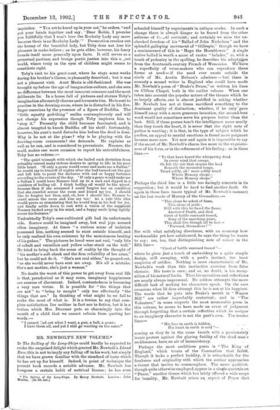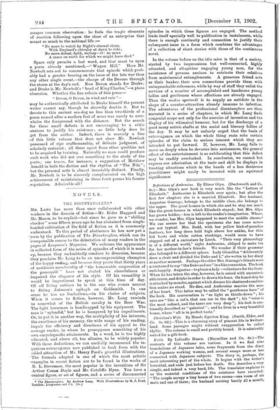• MR. NEWBOLT'S NEW VOLUME.*
IF The Sailing of the Long-Ships could hardly be expected to evoke the surprised delight which greeted Mr. Newbolt's Island Race, this is not to imply any falling off in his work, but simply that we have grown familiar with the standard of taste which he has set up for himself. Indeed, in point of technique the present book records a notable advance. Mr. Newbolt has foregone a certain habit of metrical license ; he has even
• The Sailing of the Long-Ships. By Henry Newbolt. London: John litirray. [2s. 6d. net.]
schooled himself-by experiments in antique modes. In such a change there is alwayk 'danger to be feared from the other extreme of fo..11,1 restraint; and certainly we miss the un- checked freedom of his " Ballad of John Nicholson" and the splendid galloping movement of "Gillespie," though we have a reminiscence of this in "lope the Hornblower." A single native ballad is worth a wire of exotic " balades," as, with a. touch of pedantry in the spelling, he describes his adaptati:on from the fourteenth-century French of Wenceslas. WW-have a superfluity of verse-makers who can reproduce these forms at need—if the need ever exists outside the circle of Mr. Austin Dobson's admirers — but there is scarcely a second writer in England who could have made Mr. Newbolt's poem of "Drake's Drum," or written his lines on Clifton Chapel, both in the earlier volume. When one takes into account the popular nature of the themes which he so largely affects, one is almost justified in asking whether Mr. Newbolt has not at times sacrificed something to the dominant quality of distinction; whether, if he only' gave himself away with a more generous incaution, the second-best word would not sometimes serve his purpose better than the best. Still, if these poems touch the intelligence more nearly than they touch the heart, it is never that the right not of pathosIs wanting; it is that, in the type of subject which he prefers, an appeal to mental emotions is found more poignant because more rare. Yet now and again it is impossible to say if the secret of Mr. Newbolt's charm lies more in the exquisite- ness of his form, or in the refinement of his feeling ; as in these
lines :—
"Ye that have heard the whispering dead
In every wind that creeps, Or felt the stir that strains the lead Beneath the mounded heaps,
Tread softly, ah ! more softly tread Where Memory sleeps— Where Memory sleeps."
Perhaps the third line is a little too daringly concrete in its suggestion ; but it would be hard to find another fault. Or again in these lines (more typical of Mr. Newbolt's manner) on the last words of Murray of the Grenadiers :—
" This alone he asked of fame, This alone of pride;
Still with this he faced the flame, Answered Death, and died. Crest of battle sunward tossed,
Song of the marching years, This shall live though all be lost—
'Forward, Grenadiers!
See with what satisfying directness, with an economy bow workmanlike yet how unlaboured, he says the thing he wants to say ; see, too, that distinguishing note of colour in the fifth line- - "Crest of battle sunward tossed "-
where he gives just a touch of embroidery to a quite simple design, still escaping, with a poet's instinct, the least suspicion of artifice. Nothing is more characteristic of Mr. Newbolt's work than this instinctive aversion from false rhetoric. His taste is sure; and so, no doubt, is his recog- nition of his natural limits. Thus his narratives and reflections, are nearly always impersonal. He seldom attempts the more difficult task of making his characters speak. On the rare occasions when lie does attempt this he is not at his happiest. The words that he puts into Drake's mouth in "Wagon Hill" are rather improbably oratorical ; and in " The Volunteer," in some respects the most memorable poem in this volume, he seems to have made an error of judgment through forgetting that a certain reflection which he assigns to an imaginary character is not the poet's own. The tender lines— "His face in earth is hidden,
His heart in earth is cold "— .
coming as they do in the same breath with a passionately ironic protest against the glaring futility of the dead man's recklessness, have an air of inconsistency.
Perhaps the most ambitious poem is "The King of England," which treats of the Coronation that
Though it lacks a perfect lucidity, it reinarkable. for the freshness and originality with which the author approaches a theme that invites to commonplace. The same qualitiek, though quite otherwise employed, appear in a single quatrain on "Peace," another theme which has lately offered a wide scope for _banality._ Mr. Newbolt seizes an aspect of Peace that
escapes common observation : he feels the tragic elements of reaction following upon the close of an enterprise that meant so much to the national life :- "No more to watch by Night's eternal shore,
With England's chivalry at dawn to ride,
No more defeat, faith, victory—O! no more A cause on earth for which we might have died."
Space only permits a last word, and that must be upon a poem already mentioned,—" Wagon Hill." Here Mr.
Newbolt sets out to commemorate that episode which prob- ably had a greater bearing on the issue of the late war than
any other single event,—the charge of the Devons through the storm at the day's end. Now Devon stands for Drake ; and Drake is Mr. Newbolt's "head of King Charles,"—a pious Obsession. Whether the fine refrain of this poem- " Devon, 0 Devon, in wind and rain "— may be authentically attributed to Drake himself the present writer cannot say, though he shrendly doubts it. But to devote to this ancient sea-dog no less than two-thirds of a ,poem named after a modern feat of arms was surely to over- whelm the foreground with the distance. But the search for these small defects is not encouraging to a critic -anxious to justify his existence ; so little help does be get from the author. Indeed, there is scarcely a line ..of this little volume that does not show Mr. Newbolt possessed of ripe craftsmanship, of delicate judgment, of -scholarly restraint ; all these apart from other qualities not to be acquired by training. Naturally no man could produce such work who did not owe something to the study of the poets ; one traces, for instance, a suggestion of Matthew Arnold in both the diction and the rhythm of "The Nile "; but the personal note is almost invariably distinct. Finally, Mr. Newbolt is to be sincerely complimented on the high achievement of maintaining in these fresh poems his former .raputation. Admirable all !



















































 Previous page
Previous page